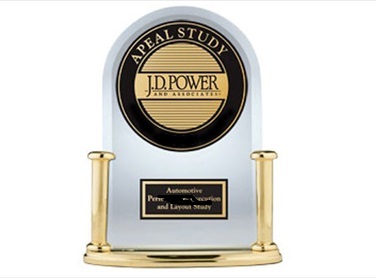Official Findings From J.D. Power 2019 Automotive Performance, Execution and Layout (APEAL) Study
 |
When it comes to driving sales, as well as generating brand loyalty and advocacy, vehicles that create joy for their owners often overcomes any negatives caused by problems they experience. This phenomenon is most effectively seen in the J.D. Power 2020 Automotive Performance, Execution and Layout (APEAL) Study,SM released today.
“Purchasing the ‘right’ vehicle is influenced by a variety of factors, depending on each buyer’s specific tastes, wants and needs,” said Dave Sargent, vice president of automotive quality at J.D. Power. “The APEAL Study measures an owner’s emotional attachment to their new vehicle and in what areas that vehicle may not be delivering on all of the positive experiences that were hoped for. Understanding this is just as valuable to automakers as knowing about quality issues and owner acceptance of new technologies. The goal for automakers is to delight customers on all these dimensions. Some are better than others at doing this.”
Now in its 25th year, the study has been redesigned for 2020. It complements the J.D. Power Initial Quality Study (IQS)SM and the J.D. Power Tech Experience Index (TXI) StudySM by measuring owners’ emotional attachment and level of excitement with their new vehicle across 37 attributes, ranging from the sense of comfort and luxury they feel when climbing into the driver’s seat to the feeling they get when they step on the accelerator. These attributes are aggregated to compute an overall APEAL index score measured on a 1,000-point scale.
Following are key findings of the 2020 study:
- Some vehicles deliver both outstanding levels of APEAL and initial quality: Eight models receiving APEAL segment awards also received awards in the 2020 Initial Quality Study: Audi A3, BMW X6, Cadillac CT6, Genesis G70, Hyundai Veloster, Jaguar E-Pace, Nissan Armada and Nissan Maxima.
- Gap between luxury and mass market brands is narrowest ever: The average APEAL score for luxury brands is 861 points, compared with 838 for mass market brands. This 23-point gap is the narrowest in the study’s history.
- Dodge’s notable achievement: By being the top-ranked mass market brand, Dodge becomes the first domestic brand to rank highest in the mass market segment for both APEAL and IQS in the same year. Only Hyundai has previously achieved the feat in the mass market segment, while Genesis, Lexus and Porsche have done so in the luxury segment.
- Tesla profiled for first time: Tesla receives an APEAL index score of 896. The automaker is not officially ranked among other brands in the study as it doesn’t meet ranking criteria. “Unlike other manufacturers, Tesla doesn’t grant us permission to survey its owners in 15 states where it is required,” said Doug Betts, president of the automotive division at J.D. Power. “However, we were able to collect a large enough sample of surveys from owners in the other 35 states and, from that base, we calculated Tesla’s score.”
Highest-Ranking Brands
Porsche ranks highest in the luxury segment and overall with a score of 881. Lincoln (876) ranks second, followed by Cadillac (874), BMW (869) and Land Rover (866).
Dodge ranks highest in the mass market segment with a score of 872. Ram (871) ranks second, followed by GMC (857), Ford (853) and MINI (846).
Mazda climbs the most in the mass market rankings, placing nine spots higher than in 2019. Cadillac climbs six places in the premium rankings, the most in that segment.
Model-Level APEAL Awards
The parent company receiving the most model-level awards (given to models ranking highest in their respective segment) is Hyundai Motor Group (five awards), followed by BMW AG and Nissan Motor Co., Ltd., with four each.
The complete list of award recipients is:
- Hyundai Motor Group: Genesis G70; Hyundai Sonata; Hyundai Veloster; Kia Stinger; and Kia Telluride
- BMW AG: BMW 7 Series; BMW X4; BMW X6; and MINI Countryman
- Nissan Motor Co., Ltd.: Nissan Armada; Nissan Maxima; Nissan Sentra; and Nissan Versa
- General Motors Company: Cadillac CT6; Chevrolet Blazer; and GMC Sierra HD
- Fiat Chrysler Automobiles: Dodge Challenger and Ram 1500
- Ford Motor Company: Ford Escape and Lincoln Navigator
- Honda Motor Company: Honda Odyssey and Honda Ridgeline
- Jaguar Land Rover Limited: Jaguar E-Pace and Land Rover Range Rover Velar
- Mazda Motor Corporation: Mazda CX-5
- Toyota Motor Corporation: Toyota C-HR
- Volkswagen AG: Audi A3
The BMW X6 is the highest-scoring model in the study. Receiving a model-level award for a third consecutive year are MINI Countryman and Nissan Maxima. BMW X4, Chevrolet Blazer, Dodge Challenger, Honda Odyssey and Lincoln Navigator each receive a model-level award for a second consecutive year.
The 2020 U.S. APEAL Study is based on responses from 87,282 owners of new 2020 model-year vehicles who were surveyed after 90 days of ownership. It was fielded from February through May 2020.
The study, which complements the annual J.D. Power Initial Quality Study (IQS)SM and the J.D. Power Tech Experience Index (TXI) Study,SM is used extensively by manufacturers worldwide to help them design and develop more appealing vehicles, and is used by consumers to help them in their purchase decisions. The 2020 redesign marks the fourth generation of the study.
For more information about the 2020 U.S. APEAL Study, visit http://www.jdpower.com/resource/jd-power-automotive-performance-execution-and-layout-apeal-study.
J.D. Power is a global leader in consumer insights, advisory services and data and analytics. These capabilities enable J.D. Power to help its clients drive customer satisfaction, growth and profitability. Established in 1968, J.D. Power has offices serving North America, Asia Pacific and Europe.


